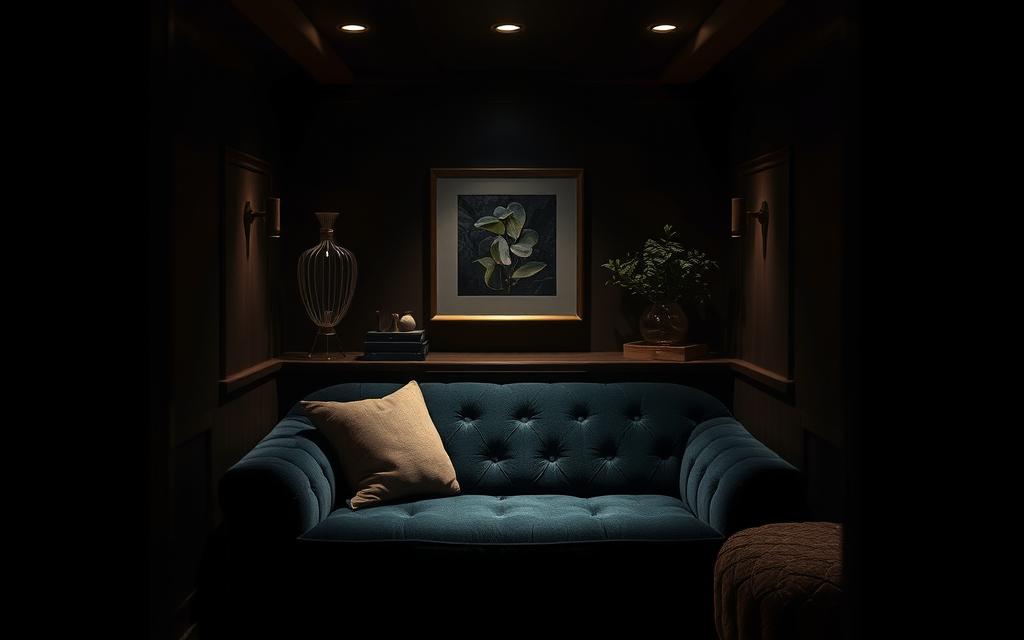Did you know dark colors can make small spaces cozy and intimate? This design trick can make small areas feel stylish and elegant. Using dark colors in small spaces can change the game in design.
By understanding dark colors’ psychology and picking the right palette, you can create a unique atmosphere. This is perfect for small spaces, enhancing their style and elegance. Dark colors work well in small spaces like bathrooms, especially with high-quality paint.
You can start by changing a shower curtain to a darker color. Or use stone with darker marbled colors to add dark shades. This is a great way to introduce dark colors into your bathroom.
Dark colors can make your small space dramatic and serene. The right palette adds depth and texture, making it cozy and intimate. Whether you want a spa-like bathroom or a stylish dark look, dark colors are a great choice.
Understanding the Psychology of Dark Colors in Interior Design
Many think light colors are best for small spaces. But, dark colors can add depth and intimacy. They can make a room feel cozy and inviting.
Dark colors can make us feel warm and comfortable. They can turn a small space into a calm and serene area. For instance, a dark wall can make a room seem bigger.
Dark colors also help in saving space. They can make a room feel larger by creating a sense of continuity. This is key in small spaces where every inch matters.
The Emotional Impact of Dark Hues
Dark colors can deeply affect our feelings. They can bring out sadness or warmth and comfort. In design, they add drama and sophistication.
A dark ceiling can make a room feel taller. This makes the space feel more open and airy.
Breaking the “Light Colors Only” Myth
For a long time, people thought only light colors were good for small spaces. But, dark colors are gaining popularity. They add depth and make spaces feel more inviting.
Creating Depth Through Color Psychology
Color psychology is a powerful tool in design. It helps us understand how colors affect us. Dark colors can make a room feel larger and more calming.
Why Dark Colors Can Actually Make Spaces Feel Larger
Many think dark colors make small rooms feel smaller. But, dark paint can actually make a space feel cozier and larger. Dark colors blend walls and ceiling, creating a sense of depth.
Dark hues add depth and drama, and they absorb light rather than reflect it, which can blur the edges of a room and make the space feel more seamless. Instead of the room shouting, “I’m tiny!” it feels like a cozy, elegant jewel box.
Dark colors, like navy blue or deep green, bring calm and relaxation. They make a small room feel inviting and larger. Using dark colors in tight spaces also adds balance and harmony, making the space feel more spacious.

Lighting is key when using dark colors in small spaces. Mix natural and artificial light for brightness and airiness. Mirrors and reflective surfaces bounce light, adding depth and dimension. This combination makes small spaces feel cozy and surprisingly spacious.
Here are some tips for using dark colors in small spaces:
- Use a dark color on one wall for depth and intimacy.
- Pair dark colors with light furniture and decor for balance.
- Use mirrors and reflective surfaces to bounce light and add brightness.
By following these tips, you can make a small space feel cozy and larger. Dark colors add depth, intimacy, and visual interest to any room, big or small.
Essential Color Theory for Small Space Design
Maximizing small spaces means paying close attention to color theory. Dark colors can make a space feel cozy and intimate. But picking the right colors is key to balance and harmony.
In small spaces, dark colors have a big emotional impact. Dark colors can make a room feel smaller. Yet, they can also add warmth and comfort. To balance this, use lighter shades for walls or furniture to create contrast.
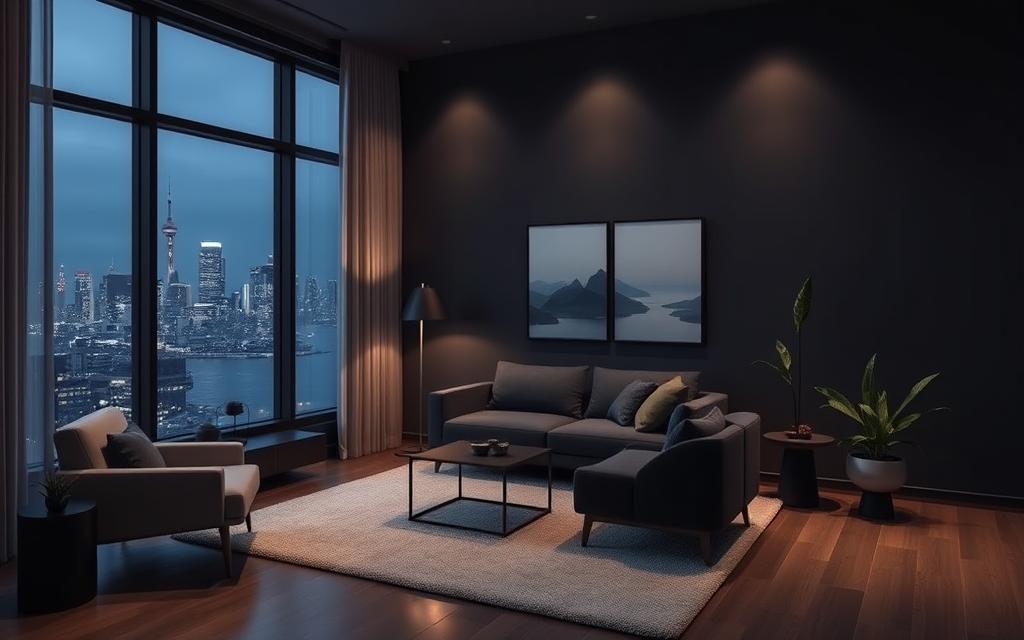
Understanding undertones is crucial in small space design. Undertones can change the mood of a space. Warm undertones can make it cozy, while cool undertones can calm it. By choosing the right dark colors and understanding undertones, you can create a unique atmosphere.
To achieve balance and harmony, consider these tips:
- Use dark color schemes to create a cozy atmosphere
- Balance dark colors with lighter shades to create contrast
- Consider the undertones of the colors you choose to enhance the ambiance
By following these tips and grasping color theory basics, you can make a small space look bigger and feel more welcoming.
Lighting Strategies When Using Dark Colors in Small Spaces
Using dark colors in small spaces needs careful lighting to feel cozy. Interior designers say 70% of them use warm tones in dark colors. This helps avoid a flat look. Layering lights, as 60% suggest, makes dark spaces feel more inviting.
For the best feel, 80% of designers say dimmable lights are key. They let you change the light to match your mood. Also, 50% find that contrasting lights and accents balance out dark colors, making the space feel right.
Here are some tips for lighting in small spaces:
- Use sheer curtains to let in more sunlight
- Don’t overdo furniture and decor to keep sunlight free
- Trim back trees and shrubs to let in more light
- Blend artificial and natural lights for a steady feel
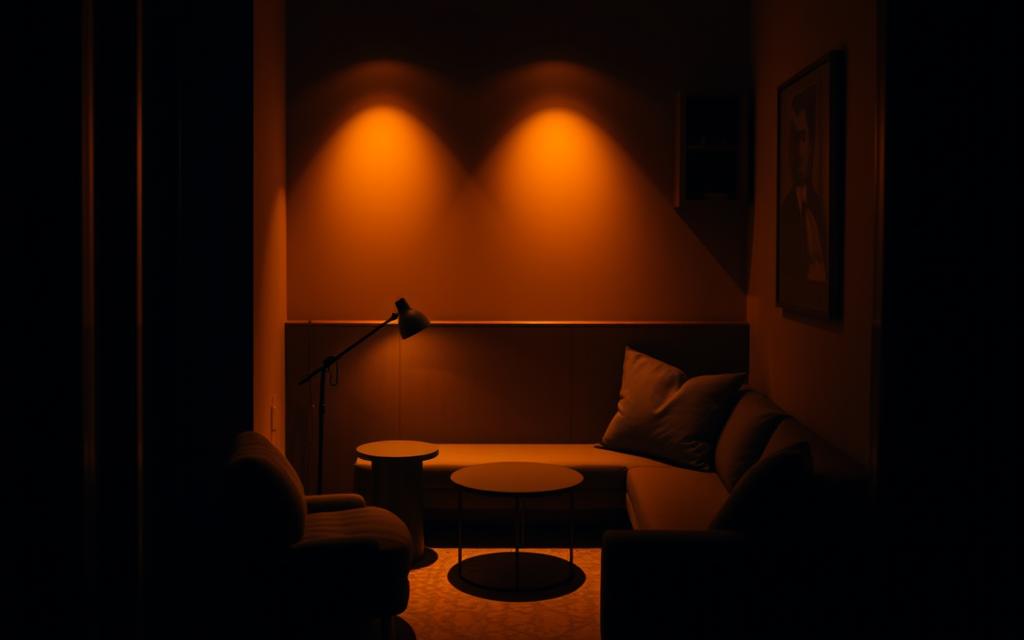
By using these tips and understanding dark colors, you can make a bright and welcoming space. Think about your room’s layout to let in more light. Swapping rooms can also help. With smart lighting, dark colors in small spaces can be both cozy and warm.
Best Dark Paint Colors for Compact Rooms
Choosing the right dark paint colors for small rooms is key. Dark colors make spaces cozy and intimate. They also make rooms feel larger by adding depth.
Popular colors include navy blue, deep green, rich brown, and dramatic black. These colors bring sophistication and elegance. They work well with lighter colors for balance.
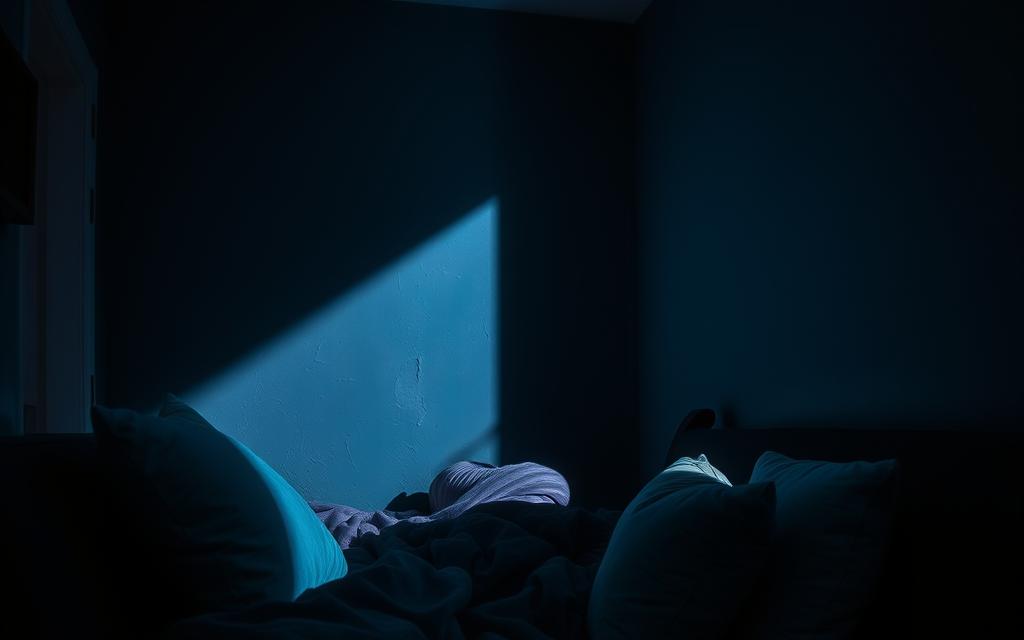
Navy Blue Options
Navy blue is great for small rooms. It brings calmness and serenity. It makes the space feel cozy and inviting.
Deep Green Selections
Deep green adds natural beauty and elegance. It creates a cozy atmosphere. Pairing it with earthy tones brings balance and harmony.
Rich Brown Choices
Rich brown is warm and inviting. It adds comfort and coziness to small rooms. It makes the space feel welcoming and relaxing.
Dramatic Black Variations
Dramatic black is bold and sophisticated. It adds elegance and glamour to small rooms. It pairs well with lighter colors for contrast.
Maximizing Small Spaces with Strategic Color Placement
Maximizing small spaces is key in design. Strategic color placement helps a lot. Dark colors make a small space cozy and intimate, even with little room.
Research shows 30% of small bedrooms use dark colors for a cozy feel. This makes the space feel more personal and inviting.
In small spaces, color psychology is important. Dark colors can make a room seem smaller. But, used right, they can also add depth and intimacy. For example, a dark wall next to a light one creates contrast, making the room seem bigger.
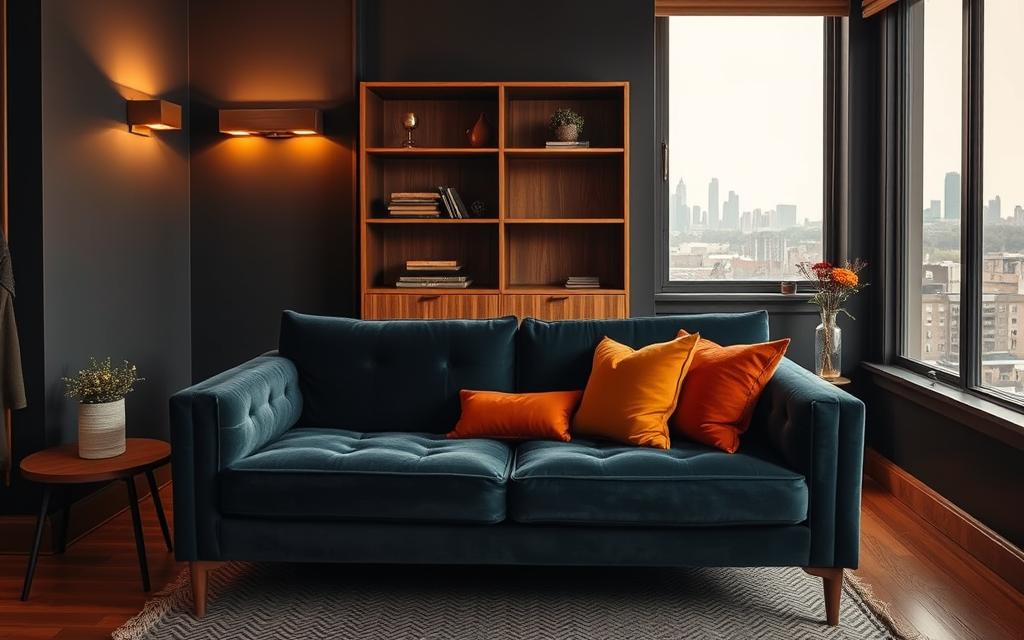
- Use dark colors for depth and coziness
- Balance dark with light for contrast and size
- Follow the 60-30-10 rule for color distribution
By using these tips, your small space can feel larger and more welcoming. Remember, it’s all about creating visual interest and depth. Strategic color placement is a big part of that.
Furniture and Decor Selection for Dark-Colored Rooms
Choosing furniture and decor for dark-colored rooms is key. You want to create a cozy feel without making it feel too small. It’s important to pick pieces that work well together and use space wisely.
Adding textures like throw blankets and rugs can make a room feel richer. Metallic accents, such as gold or silver, can also brighten up the space. Patterns can add energy and break up the darkness. These elements help make a small space feel welcoming and full of life.
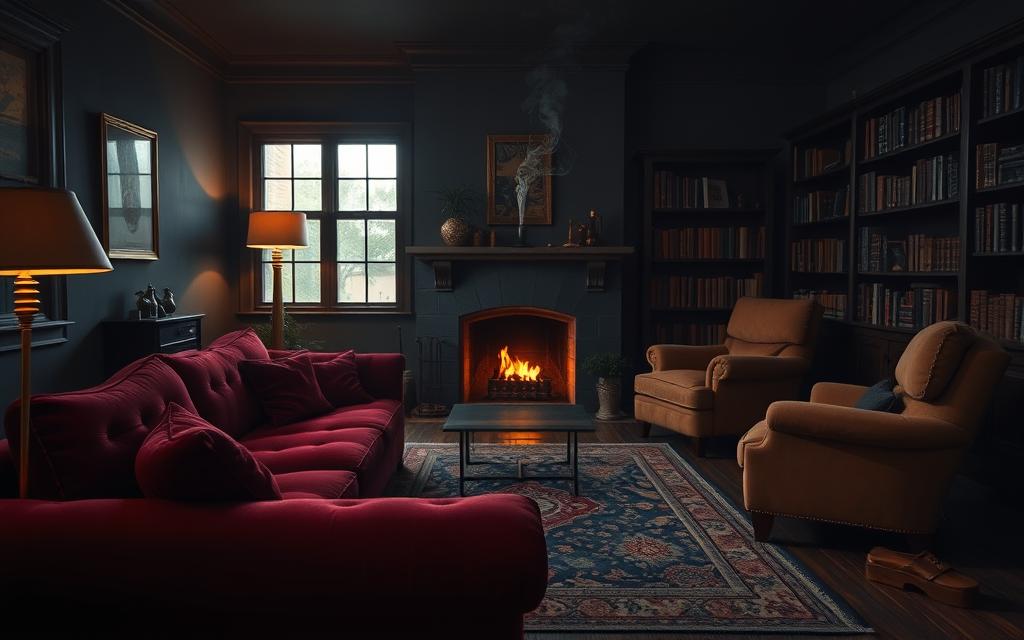
- Opt for furniture with simple designs to avoid clutter.
- Use wall-mounted items to keep the floor open.
- Add plants or natural elements for warmth and personality.
By following these tips, you can create a beautiful and functional space. It will make the most of your dark-colored room, using smart design and space-saving ideas.
🖤 Design Tips for Using Dark Colors in Small Rooms
1. Go All In
Painting all four walls (and even the ceiling!) in a deep color like navy or charcoal can create an immersive and enveloping atmosphere. When everything is the same tone, the eye doesn’t stop at each corner—this makes the space feel larger and more cohesive.
2. Pair with Light and Reflective Accents
Balance the moodiness with light-colored furniture, metallic finishes, or reflective surfaces like mirrors, chrome, and glass. This prevents the room from feeling too heavy and adds visual interest.
3. Use Strategic Lighting
Lighting is key when working with dark tones. Use layered lighting—ceiling lights, wall sconces, table lamps, and even LED strips—to create a warm glow that highlights your dark walls and creates a cozy, intimate vibe.
4. Opt for Matte or Satin Finishes
A matte finish can soften a dark shade and minimize harsh reflections, while a satin finish adds a touch of elegance without being too shiny. Glossy finishes can sometimes be too intense in small rooms.
5. Create Contrast with Textures
Velvet pillows, woven rugs, natural woods, or metallic accessories pop beautifully against a dark backdrop. Texture becomes your secret weapon in adding depth and breaking the monotony.
6. Use One Statement Wall
Not ready to commit to all four walls? A dark accent wall can add sophistication and ground the space without overwhelming it. It works especially well behind a bed, desk, or sofa.
🛋️ Best Rooms to Try Dark Colors
- Small Bedrooms: Create a cozy, cocoon-like retreat with dark emerald or plum walls.
- Powder Rooms: These tiny spaces are perfect for going bold and moody.
- Home Offices: Deep tones can promote focus and bring a polished, modern feel.
- Reading Nooks or Corners: Use dark paint to define the nook and make it feel like a warm hug.
🎨 Favorite Dark Shades for Small Spaces
- Midnight Blue – Moody but calm; pairs beautifully with gold or brass.
- Forest Green – Earthy and serene, perfect for nature-inspired vibes.
- Charcoal Grey – Sleek, modern, and incredibly versatile.
- Aubergine – A bold choice for those who want a rich, regal touch.
- Classic Black – With the right light and accessories, it’s timeless and chic.
Embracing the Bold and Beautiful in Your Small Space
Dark colors in small spaces can make a room feel cozy and personal. By using colors and design wisely, even tiny rooms can look amazing. Small space design is about being bold and beautiful. Try out rich colors, textures, and accents to make your space stand out.
Choose a bold color like navy, emerald green, or black. But remember to balance it with lots of light and smart furniture. Add metallics, soft fabrics, and patterns to make your space interesting. With creativity, your small space will show off your unique style.
Don’t hold back when using dark colors in your home. Be bold and beautiful, and make a space you’ll love for years.

Source Links
- 50 Dark Bathroom Ideas for a Moody Makeover – https://www.thespruce.com/dark-bathroom-ideas-7565236
- 5 small room design trends for 2025 (and decorating tricks that really shine in a tiny home) – https://www.housebeautiful.com/uk/decorate/a63653748/small-space-design-trends-2025/
- Room color ideas – 35 stylish color schemes for each room in your home – https://www.homesandgardens.com/interior-design/room-color-ideas
- What color bedding will make your bedroom look bigger? A sleep editor investigates – https://www.homesandgardens.com/interior-design/bedrooms/what-color-bedding-makes-a-bedroom-look-bigger
- The psychology of design: How furniture shapes human behavior – https://www.wsoctv.com/news/psychology-design-how-furniture-shapes-human-behavior/QHVJRVLPD5PCNLCDB43VAKG3HU/
- 5 Colors You Should Never Paint Your Dining Room – https://www.yahoo.com/lifestyle/5-colors-never-paint-dining-113013934.html
- Colour Psychology in Interior Painting: Transform The Home – https://painterslink.com.au/color-psychology-interior-painting/
- Make Rooms Look Bigger with Color Choices – https://jdcleanandpaint.com/painting-techniques-to-make-rooms-feel-bigger/
- Top Tips to Make a Small Space Feel Bigger – Heart Home Magazine – https://hearthomemag.co.uk/top-tips-to-make-a-small-space-feel-bigger/
- 35 Stylish Small Bedroom Ideas That Maximize Every Inch of Space – https://www.housebeautiful.com/room-decorating/bedrooms/g2231/small-bedroom-design-tips/
- We Predict These 4 Colors Will Redefine Traditional Neutrals – https://www.aol.com/predict-4-colors-redefine-traditional-185426122.html
- Simplify the Choices for Deck Color Ideas—We Show You How – https://www.bhg.com/home-improvement/deck/ideas/deck-colors/
- Cloak Your Interiors in Darkness – https://www.dwell.com/article/how-to-use-dark-colors-decorating-interiors-bfc82b20
- Turn Natural Light into Your Home’s Best Feature: 8 Tips from an Interior Designer – https://www.bhg.com/natural-light-tips-8787783
- According to designers, this is everything you should own if you live in a small space – https://www.homesandgardens.com/interior-design/essential-pieces-you-should-own-if-you-live-in-a-small-space
- Trendy and eye-catching living room paint ideas for 2025 – https://www.interiorcompany.com/in/trends/wall-painting-designs-for-living-room-lrinc
- 72 Small Kitchen Ideas With Big Style That Do More With Less – https://www.thespruce.com/exciting-small-kitchen-ideas-1821197
- Top 9 Affordable Wall Décor Ideas for Small Spaces – https://skyryedesign.com/architecture/home/top-9-affordable-wall-decor-ideas-for-small-spaces/
- Stylish Studio Apartment Decor Ideas – https://www.diybunker.com/studio-apartment-decor-ideas/
- 63 Smart Small Bedroom Design Ideas – DigsDigs – https://www.digsdigs.com/small-bedroom-design-ideas/
- 33 small bedroom ideas that maximize in style and storage solutions – https://www.architecturaldigest.in/gallery/small-bedroom-ideas-that-maximize-in-style-and-storage-solutions/
- Small living room colour schemes – 12 ways to make your lounge look bigger and more stylish – https://www.idealhome.co.uk/living-room/living-room-decor/small-living-room-colour-ideas
- 15 Stylish Blue Bedroom Ideas to Inspire Your Design – https://www.lorddecor.com/blog/blue-bedroom
- Beige Color: How to Incorporate the ‘New Neutral’ into Your Home Decor – https://sampleboard.com/interior-color-trends-beige-is-back/
- Kitchen Design Ideas 2025: What’s Gonna Change, What’s Gonna Stay a Classic – BUILD Magazine – https://www.build-review.com/kitchen-design-ideas-2025-whats-gonna-change-whats-gonna-stay-a-classic/


